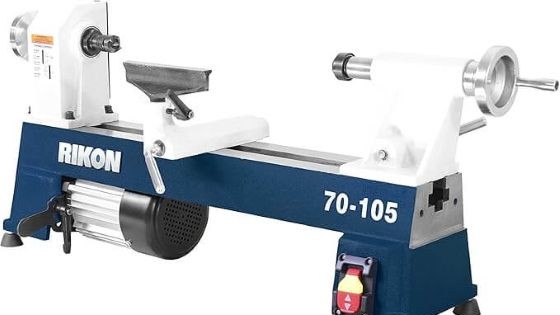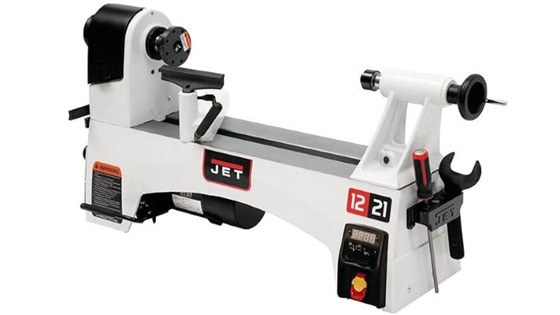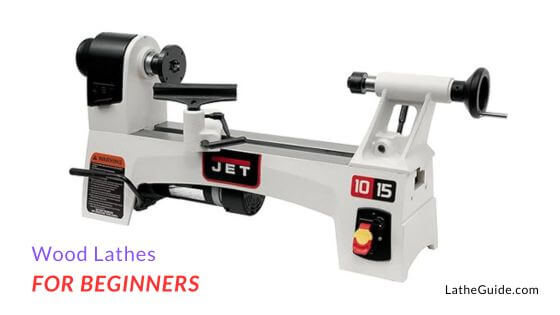Dipping your toes into the captivating world of woodturning doesn’t require a massive machine or a hefty investment. Mini lathes offer an accessible entry point, perfect for crafting smaller items like pens, boxes, tool handles, and intricate spindles. Among the crowd of entry-level options, the RIKON 70-105 10″ x 18″ Mini Wood Lathe consistently stands out as a proven workhorse, praised for its solid build and exceptional value.
But is this affordable machine the essential starting point it claims to be? In this in-depth RIKON 70-105 review, we’ll dissect its features, evaluate its real-world performance, weigh the pros and cons, and help you decide if this popular mini lathe is the key to unlocking your small-project potential in 2025.

RIKON 70-105 Review: Key Specifications
- Lathe Type: Mini Wood Lathe
- Motor: 1/2 HP TEFC (Totally Enclosed Fan Cooled), 115V
- Swing Over Bed: 10″
- Distance Between Centers: 18″
- Speed Control: Manual Belt Change (5 Speed Steps)
- Speed Range: 500, 1180, 1700, 2225, 3200 RPM (approx.)
- Spindle Taper: MT2 (Morse Taper #2)
- Tailstock Taper: MT2
- Spindle Thread: 1″ x 8 TPI
- Tool Rest Length: 6″
- Weight: Approx. 75 lbs (34 kg)
- Construction: Cast Iron Bed, Headstock, Tailstock, Tool Rest Base
Deep Dive into Features
While priced affordably, the RIKON 70-105 boasts several features that elevate it above basic entry-level machines.
Solid Cast Iron Construction: Stability Where it Counts
Unlike some budget mini lathes that utilize lighter materials, the 70-105 features a substantial cast iron bed, headstock, and tailstock. This heavy construction (around 75 lbs) is crucial for minimizing vibration during operation, leading to smoother cuts, better finishes, and increased safety. It feels reassuringly solid on the workbench.
Reliable 1/2 HP Motor: Power for Mini Tasks
The 1/2 HP motor provides sufficient power for the tasks this mini lathe is designed for. It handles small spindle work, pen blank drilling and turning, and shaping small bowls or boxes from appropriate wood species without issue. While it won’t hog off huge amounts of dense hardwood like a larger lathe, it’s well-matched to the machine’s scale.
MT2 Tapers: A Major Advantage in its Class
One of the most significant benefits of the RIKON 70-105 is its inclusion of MT2 (Morse Taper #2) tapers in both the headstock spindle and tailstock quill. This is the standard taper size found on larger midi and full-size lathes, meaning you have access to a much wider range of compatible and higher-quality accessories (like drive centers, live centers, drill chucks) compared to mini lathes equipped with the smaller MT1 taper. This future-proofs your accessory investments if you eventually upgrade.
5-Speed Manual Belt Change: Simple and Effective
To keep costs down, the 70-105 utilizes a manual belt change system for speed adjustments. Accessing the pulleys via the side panel allows you to move the belt across 5 different steps, providing distinct speeds suitable for various operations (e.g., lower speeds for roughing, higher speeds for sanding/finishing). While less convenient than Electronic Variable Speed (EVS), this system is mechanically simple, reliable, and gets the job done effectively.
Useful Capacity for Small Work
The 10″ swing allows turning bowls or platters up to 10″ in diameter, while the 18″ distance between centers is ample for most small spindle projects like tool handles, pens, chair spindles, or small table legs.
Performance and User Experience
Using the RIKON 70-105 offers a solid introduction to woodturning:
- Setup: Assembly is straightforward and typically takes minimal time.
- Operation: The lathe runs relatively smoothly for its size and price, especially when securely mounted. The cast iron construction noticeably dampens vibrations compared to lighter machines. Noise levels are generally acceptable.
- Specific Tasks: It excels at pen turning and small spindle work. Drilling blanks using the tailstock is easy. Roughing out small bowl blanks (e.g., 6-8 inches) is achievable, though requires lighter cuts compared to more powerful lathes.
- Speed Changes: Changing speeds requires stopping the lathe, opening the access panels, and manually moving the belt. It’s not instantaneous like EVS but becomes quick with practice thanks to the easy-to-use tensioning lever.
- Stability: The weight provides good stability on a sturdy workbench, preventing the lathe from “walking” during normal use.
Pros
- Excellent Value for Money: Offers solid performance and build quality at an entry-level price.
- Robust Cast Iron Construction: Provides superior stability and vibration damping for its class.
- Versatile MT2 Tapers: Allows use of a wide range of standard lathe accessories.
- Reliable Performance: Sufficient power and adequate speed range for intended mini lathe tasks.
- Good Stability for its Size: The weight contributes significantly to smooth operation.
- Ideal Starting Point: Perfect for beginners learning the fundamentals or dedicated small-project turners.
- Compact Footprint: Doesn’t require a large workshop space.
Cons
- Manual Speed Changes: Less convenient than EVS; requires stopping the lathe to change speeds.
- Limited Power: The 1/2 HP motor is adequate for small items but will struggle with larger diameters, very dense woods, or aggressive cuts.
- Limited Capacity: Restricted to smaller projects (up to 10″ diameter, 18″ length).
- No Reverse Function: Common for mini lathes in this price range, but limits some advanced sanding techniques.
Who is the RIKON 70-105 Best For?
The RIKON 70-105 is an excellent choice for:
- Budget-Conscious Beginners: Provides a reliable, quality introduction to woodturning without breaking the bank.
- Dedicated Pen Turners: Offers the precision, MT2 taper, and appropriate speed range needed for pen making.
- Hobbyists Focused on Small Projects: Ideal for those primarily making boxes, finials, tool handles, ornaments, or other small-scale items.
- Woodturners with Limited Workshop Space: Its compact benchtop design fits easily into smaller areas.
- Anyone wanting a solid second lathe for smaller tasks or demonstrations.
Alternatives to Consider
- WEN Mini Lathes (Variable Speed Models): Offer electronic variable speed at a similar or lower price point, but potentially compromise on build quality (less cast iron) or use MT1 tapers.
- Other Basic Mini Lathes (e.g., Harbor Freight): May be cheaper but often sacrifice build quality, stability, and crucial features like the MT2 taper found on the RIKON.
Conclusion & Verdict: An Essential Mini Lathe Choice
Does the RIKON 70-105 live up to the hype as an essential mini lathe? For its target audience and price point, the answer is a resounding yes. While it lacks the convenience of electronic variable speed, it compensates with rock-solid cast iron construction, excellent stability, and the incredibly valuable MT2 tapers, features often missing on competing budget models.
It provides a reliable, smooth-running platform perfect for learning the fundamentals of woodturning, mastering pen making, or executing a wide variety of small projects. If you’re looking for an affordable, no-nonsense mini wood lathe built to last and ready to accept standard accessories, the RIKON 70-105 remains one of the best value and most highly recommended options on the market in 2025. It’s a fantastic foundation to conquer small projects and start your woodturning adventure.




